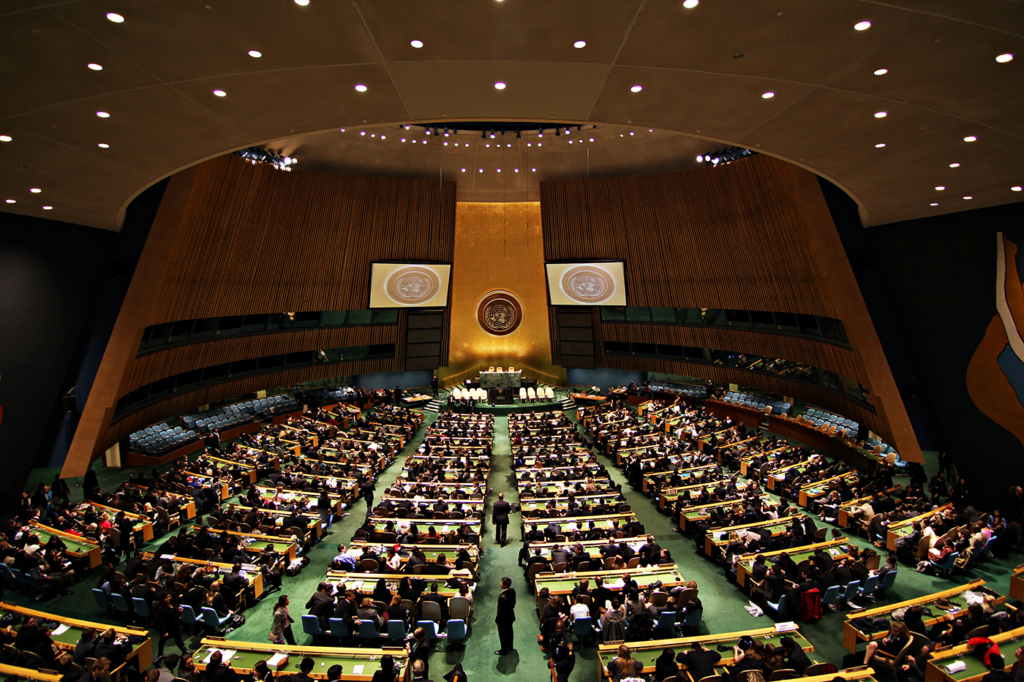Only two years after the adoption of the Universal Declaration of Human Rights on December 10th, 1948, the United Nations established December 10th as International Human Rights Day. It would be another eighteen years before the first binding human rights treaties were adopted and another ten years before they came into force.
Since then, human rights have become a significant aspect of moral and political discourse internationally and domestically. The UN—and regional organizations like it—have promulgated a multitude of human rights treaties and policies, and an array of councils, committees, and courts to monitor, debate, and adjudicate all manner of human rights issues. Individual nations have incorporated human rights into their domestic legislation. Nongovernmental organizations and activists regularly advocate on behalf of human rights issues.
But now human rights are in trouble.
Yale historian Samuel Moyn says this crisis is the result of “swelling inequality.” Harvard law professor (and author of a history of the drafting of the Universal Declaration) Mary Ann Glendon has pointed to a “growing skepticism” about the idea of human rights and to the bias and politicization of the institutions that were created to protect these rights. Some even have criticized the Declaration itself for mixing civil and political rights with economic and social rights. And countless observers have blamed activists and various organs of the UN (and other international bodies), which have proliferated new, spurious human rights (from abortion and assisted suicide to smoking cannabis, access to the internet, and noise abatement) to such an extent that they water down all rights. Human rights have become self-negating (how does the right to life protect the right to abort an unborn human?), less important, and harder to protect.
Start your day with Public Discourse
Sign up and get our daily essays sent straight to your inbox.In light of this, the U.S. State Department announced in July the creation of a Commission on Unalienable Rights, tasked with providing “fresh thinking about human rights discourse where such discourse has departed from our nation’s founding principles of natural law and natural rights.” Secretary of State Mike Pompeo pointed particularly to the proliferation of rights and the need to review the role of human rights in American foreign policy. He appointed Mary Ann Glendon as chair of the Commission, explaining that the Commission would give advice on human rights “grounded in our nation’s founding principles and the principles of the Universal Declaration.”
Creating the Commission could be seen as the fulfillment of a promise. In June 2018, the U.S. withdrew from the UN Human Rights Council, a deeply politicized and problematic body, many of whose members have “flawed-to-abysmal human-rights records and policies” and very little “incentive to pursue and commit to universal human rights.” Earlier in 2017, then-Ambassador Nikki Haley signaled the U.S.’s intention to continue the cause of universal human rights, saying that unless there were changes at the Council, the U.S. would “pursue the advancement of human rights outside of the Council.” Thus no one should have been surprised at the Commission’s assignment to revisit, clarify, and uphold the meaning of human rights in “the distinctive rights tradition” of the U.S.
Criticism of the Commission, Natural Law, and Unalienable Rights
The immediate and sustained response from activists has been skepticism, if not outright indignation, at the perceived attempt to redefine and restrict rights. Journalists have decried the Commission as “an effort to make Washington the center of a global, faith-based conservative order.” It will allegedly “roll back human rights” and undermine them across the globe. Some have criticized the use of terms like “founding principles” and “natural law” as code for a plan “to focus less on protecting women and LGBT people.”
Media outlets are not the only dissenters. Activists in the human rights movement castigated the Commission extravagantly, even before it had met. Several law professors speculated that the Commission will advance “a specific brand of conservative arguments,” aimed at reducing gains on LGBT and women’s rights and “supporting longstanding U.S. hypocrisy on human rights.” And the Center for Reproductive Rights put out this remarkable fantasy:
This Commission is nothing less than a subterfuge for undermining reproductive rights. . . . There is a clear and unequivocal consensus by UN human rights treaty bodies and independent experts that reproductive rights are human rights, grounded in the right to life, health, equality, non-discrimination, and freedom from cruel, inhumane, and degrading treatment, among other rights.
Even U.S. lawmakers have expressed deep concern that the Commission will threaten “widely accepted interpretations of human rights law to push a narrow, discriminatory agenda that decides whose rights are worth protecting and whose rights the administration will ignore.”
Responding to this hysteria is not difficult.
Critics are positively wrong when they say the Commission will “roll back” women’s reproductive rights and LGBT rights.
Critics are positively wrong when they say the Commission will “roll back” women’s reproductive rights and LGBT rights. How does one roll back non-existent rights? Human rights do not arise from simple wish or ipse dixit, and there are no LGBT rights in international treaties. Attempts to create them at the UN have met with consistent difficulty for decades. As Ryan Anderson has noted, people who identify as LGBT have human rights, but there are no “LGBT rights.”
Likewise, there is no human right to abortion in international law—either in treaty or customary law. To the contrary, express treaty texts (“appropriate legal protection, before as well as after birth”), implications of the text (“Sentence of death . . . shall not be carried out on pregnant women”), and the travaux préparatoires (“The principal reason for providing . . . that the death sentence should not be carried out on pregnant women was to save the life of an innocent unborn child”) indicate clearly that many states believe that unborn human beings have the right to life. Hence the concerted effort of the UN’s treaty-monitoring committees to coerce states into changing their domestic abortion laws, backed not by express rights in the respective treaties, but only by the committees’ own, nonbinding general comments.
Whatever contrived consensus may exist among the treaties’ committees is demonstrably not unequivocal among states internationally. And despite the committees’ ever-broadening interpretation of the treaties, the treaties’ plain language does not include a right to abortion explicitly or under its many euphemisms.
Moreover, the idea that the Commission will decide whose rights are worth protecting is factually wrong—the Commission has no such mandate or power.
Which Rights Do We Mean?
The project to legally recognize universal human rights was initially grounded on broad agreement in pursuit of the common good. Within this framework, rights are the object of the state’s duty to those rights-holders.
But the modern human rights movement interprets “right” to mean a “power to affect the freedom of action of others”—putting an undue emphasis on radical autonomy, and turning Western elite political values into universal rights. This hinders consensus and diminishes international recognition of the core human rights that protect the inherent dignity of all members of the human family, especially in a world of considerable political and cultural diversity.
The sensible and feasible solution, according to Glendon, is to emphasize the core rights that the Universal Declaration prioritizes and treats as almost non-negotiable.
But before that can be done, we need to clarify significantly the meaning of rights. If the Commission is to help the U.S. protect human rights, it needs first to try to understand their nature. In an era of expressive individualism, rights must mean something stronger than “openness to an unlimited authorization of actions or behaviors with no rule or purpose.” New, spurious rights proliferate—and core rights are subverted—not only when we allow rights to be redefined, but also when we do not distinguish them from one another precisely.
Unalienable rights of the American kind (and those in the Universal Declaration) are simply those rights that all human beings possess by virtue of being human. They cannot be surrendered or taken away. And they are in no way “archaic”: the phrase “unalienable rights” appears in the Universal Declaration and in over nine other human rights treaties, many of which activists uniformly support.
Human rights are an individual’s entitlements to the protection of his or her human dignity. They are, as John Finnis explains, the point of duties of justice—states do not create them, but recognize and uphold them. They are legally recognized either by means of multilateral treaties that obligate states to protect them, or by custom (that is, a state’s consistent practice). The Universal Declaration itself is not a statement of binding legal obligations, but a declaration of principles. It serves as a common legal standard that can be implemented in a variety of ways.
Human rights are frequently conflated with civil rights, that is, the basic legal rights that protect free and equal citizenship in a state. Civil rights are under the domain of domestic governments, which must create, implement, and uphold them. Though civil rights may be more extensive than human rights, and may even be broadened over time, this does not mean that any claim to a new civil right is necessarily legitimate, or that every civil right is also a human right.
The Universal Declaration recognizes the diversity of the world’s concerns, but it prioritizes certain core political rights to prevent the sort of change that is being advanced by the modern human rights movement. In particular, the Declaration “turns on a concept of the human person in community, and of the free and just society required for human flourishing.”
Reaffirm the Universal Declaration by Emphasizing Natural Law
Restoring human rights discourse and practice also requires that we make the universality of rights credible again. The simplest—because it is the firmest—way to justify universal human rights is to show how the natural law, on which these rights are based, lies at the foundation of all the world’s major philosophical and religious systems. Universal rights gain legitimacy in the eyes of diverse communities of people only if they affirm basic (first) principles that everyone already accepts.
The notion of objective justice that natural law theory articulates is essential to international law, and without it, one could not enforce human rights. Antonio Augusto Cançado Trindade, Judge on the International Court of Justice, explains:
It is indeed the principles of international law which, by permeating the corpus juris of international law, render it a truly normative system. Without those principles, the norms and rules of international law would not have evolved, by their implementation, into a legal system. . . . Those principles are a manifestation of the international juridical conscience; they reflect the status conscientiae of the subjects of international law.
In other words, the general principles of international law (e.g., the dignity of the human being, the unalienability of rights) do not depend on the will of states, nor on the consent of the subjects of law. When legally binding human rights depart from the natural law principles that undergird them, their application leads to violations of rights and to serious injustices. But a correct understanding of natural law rules out the overreaching claims of contemporary human rights activists by pointing us toward the true ends of law: the common good of all human beings, the realization of justice, and the rule of law.
Keep Justice in the Foreground and Prioritize Persons
The Roman Emperor Justinian wrote: “Knowledge of law amounts to little if it overlooks the persons for whose sake law is made.” By nature, the human person is the subject and holder of unalienable human rights, and one’s international legal personality cannot be separated from one’s human dignity. By virtue of this fundamental principle, every person ought to be respected in law. In this way, natural law is a “restraint on alienation” of human dignity. Nothing that alienates one’s dignity can be called a human right.
Without a proper understanding of human beings (and human flourishing) that is grounded in natural law, human rights will always fall short of the lofty goals set by the Universal Declaration. The question of the nature of the human person is the proper center of our rights discourse. Human rights either belong to each human being by nature, or they are claims based in sheer human will, and therefore we are free to define them and limit the set of people who may enjoy them.
No doubt it would be prudent for the Commission to scrutinize U.S. practice and policy in light of our founding principles, and to make appropriate recommendations. After all, the U.S. must get its own act together. But that does not prevent the Commission from speaking about universal human rights. America could gain international credibility on the question of rights by owning up to our own failures, but also by elevating the conversation, promoting intellectual and moral responsibility, and explaining our principles more precisely. The Commission might not save the UN from itself, but it might save human rights from the human rights movement.














